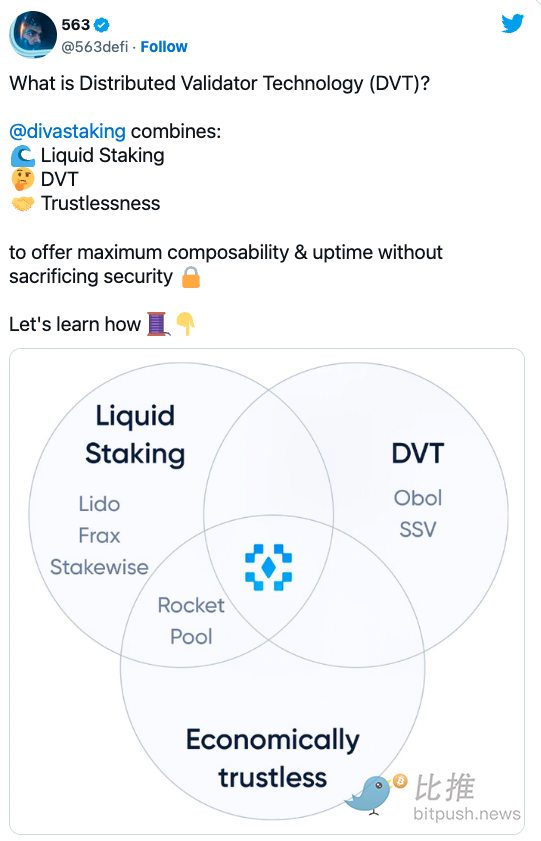Bankless: A Review of the Top Five Potential Projects in the LSD Track, Can Lido Hold Up?
Title: What's Next for Liquid Staking?
Author: 563, Bankless
Compiled by: Mary Liu, BitpushNews
Liquid staking derivatives (LSD) are one of the hottest topics of 2023. These protocols accept deposited ETH, stake it to secure the network, and distribute staking rewards to LSD holders (after deducting some fees). This greatly simplifies the staking process for users and allows LSD to be used in other DeFi applications.
The market leader, Lido, owes its dominant position largely to its "early and ubiquitous entry," enabling it to leverage its network effects to become the "safest" choice for users entering the ETH staking world.
So how do other protocols compete?

Despite some purists wanting to believe otherwise, market participants often choose the platform that best aligns with their interests. To compete for market share (and even undermine Lido's monopoly), newcomers must offer something better or different.
In our view, these advantages may include:
- Higher returns
- Easier onboarding
- Greater composability and/or security
- Innovations
This article outlines five potentially most promising LSD projects, exploring how they compete with market leader Lido in terms of technology, economics, and user experience, and how they aim to disrupt the market by providing novel solutions.
1. Prisma
Prisma's first Mirror article caused a stir, positioning itself as the "ultimate game for liquid staking" tokens, aiming to leverage Curve's flywheel effect to drive significant adoption of its stablecoin (acUSD). Similar to projects like Gravita and Lybra, Prisma uses and adjusts Liquity's model, allowing acUSD to be minted against any of the top five LSDs (Lido's stETH, Coinbase's cbETH, Rocket Pool's rETH, Frax's frxETH, and Binance's WBETH), with weights and future integrations currently to be determined.
Theoretically, the desire to hold acUSD will incentivize more users to stake their ETH using liquid staking tokens.
- In addition to trading fees, acUSD liquidity providers will also earn CRV, CVX, and PRISMA tokens along with standard ETH staking rewards.
- With launches on Curve, Convex, Frax, Conic, and LlamaNodes, Prisma has already partnered with several heavyweight projects, starting strong.
2. Swell
Swell's swETH LSD has gained widespread attention from the community due to its current Voyage incentive program, rapidly rising in rank with a TVL exceeding $50 million. Swell promotes itself as aligned with Etherean values, aiming to make the interaction process easier for new users.
- Users can purchase ETH directly from their app via Google/Apple Pay, credit card, or bank account.
- Partner integrations allow users to earn swETH rewards directly by providing liquidity.
3. unshETH
unshETH aims to incentivize healthy competition in the LSD space by offering a diversified LSD composed of a basket of underlying LSDs. The weights of these LSDs are balanced through governance and currently include Lido's wstETH, RocketPool's rETH, Coinbase's cbETH, Frax's sfrxETH, Anker's ankrETH, and Swell's swETH. As arbitrageurs are incentivized to balance the weights of LSDs based on unshETH, each governance decision will impact user behavior on the platform.
- In addition to standard staking rewards from a basket of underlying LSDs, unshETH can also earn additional income through rebalancing fees.
- Built on LayerZero means unshETH can be transferred natively across chains, enabling new liquidity strategies.
- Inclusion in unshETH will create new buying pressure for emerging LSD projects, making unshETH a potential launch partner.
4. Origin Ether
By combining automated yield-generating strategies with native Ethereum staking rewards, Origin Ether can offer substantial rewards to its depositors. Similar to the other LSDs mentioned, OETH is backed 1:1 by deposited ETH, which is distributed across various DeFi platforms to earn yields. Current yields come from (in weighted order):
- ETH-OETH Convex liquidity pool
- Rocket Pool's rETH
- Frax's sfrxETH
- Lido's stETH
High yields have allowed Origin Ether to accumulate approximately $35 million in TVL in just one month.
- Over the past 30 days, Origin Ether's annualized rate has been around 9%, double that of some competitors in the same space.
- Origin's automated yield strategy provides users with maximum convenience, eliminating the need to shop around for the highest yields.
5. Diva
Diva aims to combine the composability of liquid staking with the decentralization brought by distributed validator technology. In short, DVT allows for the distribution of validator private keys through trust-minimized key sharing. In practice, users combine the composability of LSD with most of the decentralization advantages of running their own ETH node, without a minimum staking threshold.


- DVT is a new technology that brings further decentralization to ETH staking.
- DVT allows for node redundancy and better uptime, making yields more stable.
The Race Has Yet to Begin
Looking back, it hasn't been long since the completion of the merge, and ETH staking is still in its infancy. Compared to other proof-of-stake (PoS) L1 networks, the percentage of ETH staked remains below 20%.
Assuming ETH staking will eventually align with the PoS majority, staking protocols have ample time to carve out their own market. This article has only showcased a small fraction of projects, each with its unique features in liquid staking derivatives, whether it's easier onboarding, new technologies, new use cases, or simply higher annualized rates; LSDfi has much potential yet to be explored.









